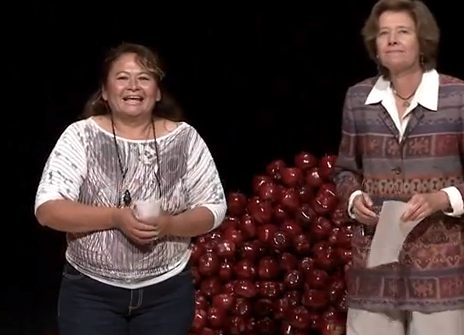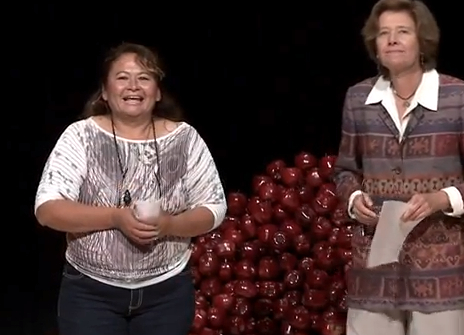
Farmworker-turned-organic farm owner, Maria Catalán with translator.
If there isn’t a TED talk on it, how do we know it’s worth talking about?
That’s how it can feel these days, as the short videos — recorded at conferences around the world — have slowly populated nearly every corner of the internet. There’s a definite allure to watching geniuses break down big ideas into bite-size bits.
But the foundation arm of sustainability-focused food service company Bon Appetit Management Company (BAMCO) chose to host a TEDx* conference on something most of us never see. Instead of featuring slick technologists or designers waxing rhapsodic about elegant ideas for a brave new future, farmworkers took the stage to share the hardscrabble realities of their present. The subject matter won’t surprise those who know BAMCO — they’ve been shining a light on farmworker issue for some time now — but the conference, and the videos that came out of it, provide a view into something much grittier and harder to summarize than what we see covered in most TED talks.
BAMCO’s Maisie Greenawalt kicked off the event, which took place at Mills College in Oakland, Calif., with an explanation of her motivation for putting it together. “This conference was born out of my frustration,” she told the audience. “My company buys about $75 million worth of produce a year, and even I don’t have access to farm-level info. I’m angry that because of America’s anonymous commodity supply chain, unless we buy from a small farmer … I can’t tell you where the food we serve is grown, much less who picked it.”
This opacity is common in our food system. And — as Greenawalt hoped — the day’s talks went a long way toward shedding light on food laborers, their experiences, and the larger economic and social context in which they’re working.
The current and former farmworkers who did speak that day brought with them stories of commitment, struggle, and the family ties that sustain. Farmworker-turned-organic farm owner Maria Catalán shared her experiences and thanked her children for working at her side; Adelfo Antonio of Swanton Berry Farm talked about life on a unionized organic farm in California; and family physician Flavio Cornejo detailing the physical effects of farmwork on the human body as he’s observed it while treating strawberry pickers in Watsonville.
A young outreach worker and aspiring health professional named José Gutierrez paid tribute to his farmworker father. “I still remember the words he said to me while standing in the middle of the rows, around people who were working non-stop,” he told the audience. And they were “this is the type of job you’ll be doing day by day if you don’t focus on school.”
Two documentary filmmakers spoke about farmworker-focused films: U. Roberto Romano, director of Children in Our Fields showed clips from the film and Sanjay Rawal shared a work in progress. Barry Estabrook, author of Tomatoland, highlighted the terrible aftermath of pesticide use in a former home of industrial agriculture called Lake Apopka, Fla. (see below).
Just so that the audience didn’t give up all hope for humanity, a series of well-spoken organizers were also invited to share their stories. Joann Lo, of the Food Chain Workers Alliance, talked about her efforts to connect laborers from all aspects of the food world (from restaurant workers to meat packers). Tim Galarneau of Real Food Challenge talked about empowering college students to control what they eat. Andrea Cristina Mercado of Mujeres Unidas talked about the need for domestic workers to band together, while Heather Franzese of Fair Trade USA drew a connection between food and clothing in her talk, Changing How You Think About Clothes. And the always-well-spoken Nikki Henderson of People’s Grocery shared her search for clues about the relationship between the Black Power and farmworker movements (see below).
One of the hardest-working organizers in the room was Gerardo Reyes-Chavez, an organizer from the Coalition of Immokalee Workers (CIW). Reyes-Chavez told the audience about the work that the CIW has done over the last decade and a half to organize disenfranchised tomato workers. The CIW has made impressive gains, against all odds, and Reyes-Chavez is still pushing for more. The coalition has convinced most of the major fast food restaurants, food service companies, and the tomato growers themselves to agree to a new game-changing pay increase for workers and a code of conduct that could infuse the lives of tomato workers with a whole new set of rights. But, he told the crowd: “We still need to bring the big buyers of the supermarket industry.” Major grocery store players like Trader Joe’s, Kroger, Publix, and Walmart have refused to come to the table.
“As long as you give me the lowest possible price,” he said, “we’re sentencing communities like Immokalee and many others in this nation to toil under the conditions of exploitation and none of this would mean anything.”
Find the complete list of talks from the TEDx Fruitvale conference on their site.
* TEDx is a program of local, self-organized events that bring people together to share a TED-like experience. (The TED conference provides general guidance and some rules and regulations for the TEDx program).



